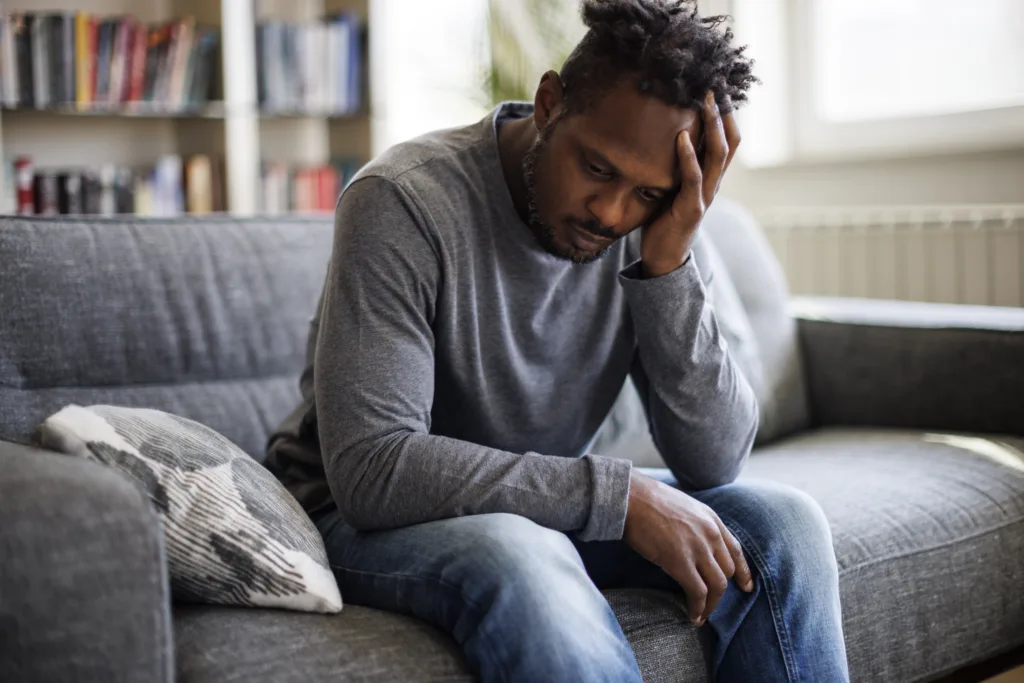Is there a Connection Between Gambling Addiction and Depression?

When we struggle with a mental health condition, we oftentimes find coping mechanisms to get its symptoms to go away. Or, when we struggle with addictive behavior, we may find that certain aspects of our mental health begin to slip and suffer.
Because addiction and mental health are so intimately connected, it is not uncommon that when one problem arises, a second one typically presents itself, too. Such is the case with problem gambling – when one engages in problematic gambling behaviors, mental health conditions like depression and suicide ideation often rise to the surface.
What is problem gambling?
Problem gambling is “defined as having some gambling-related difficulties, which can also be called symptoms. Having many of these symptoms, at the same time or within the same year, could [indicate] a gambling disorder….Generally, having a few gambling-related problems indicates problem gambling; and the more gambling-related problems you have, the more likely it is that you might have a gambling disorder.”
Gambling habits may turn into addiction in pursuit of the release of dopamine that comes with feeding addictive habits. This can lead to several problems – social, familial and financial – which are oftentimes associated with poor mental health.
Interestingly, problem gambling can affect the brain’s reward system in a way that is similar to the effects of drugs – the rush that comes from winning, or even potentially winning, elicits the same release of dopamine that keeps users coming back again and again, regardless of the negative side effects.
At a technical level, gambling addiction differs from drug or alcohol addiction since gambling does not alter brain chemistry in the way drugs or alcohol do; nor can one overdose from gambling. However the similarities in the way the reward system is activated cannot be overlooked.
Does problem gambling impede mental health?
In the same way drug and alcohol use negatively impacts mental health, gambling addiction has an equally negative effect. Signs will be present that problem gambling is interfering with your life, including:
- Increased stress and anxiety as a result of needing to file bankruptcy or having severe financial debt as a result of gambling habits
- Always having thoughts of when you can next gamble on your mind, and putting a lot of effort into finding a nearby location where gambling is possible
- Spending a lot of time at casinos, bars and lounges, or even in your home on a gambling website or app, and neglecting responsibilities (work, school, social) as a result
- Feeling the urge to bet higher or make riskier moves to get the same dopamine release and rush of excitement
- Failing to stop gambling when you try on your own
- Continuing to gamble even when you notice the negative consequences
As all of these symptoms begin to build, mental health is guaranteed to slowly decrease.
The connection between gambling and depression
There is irrefutable evidence that problem gambling is closely linked to the experience of depression and poor mental health. “An estimated 96 percent of people with gambling problems have at least one other psychiatric disorder. Substance use disorders, impulse-control disorders, mood disorders, and anxiety disorders are particularly common among people with gambling problems.”
Studies have shown that depression is one of the highest comorbidities associated with problem gambling – in a study of 3,596 individuals, approximately “33 percent had experienced at least a depressive symptom; problem gamblers were more likely to experience one symptom of depression when compared with non-gamblers or those not at risk.”
Additional “[c]linical research has consistently revealed that up to 75 percent of compulsive gamblers suffer from symptoms of major depression.”
So why are these two so intimately connected? What about gambling behaviors that cause symptoms of depression and vice versa?
For one, people struggling with symptoms of depression may feel a desire to escape from symptoms by turning their attention to gambling; the temporary highs felt while gambling may provide a short-lived relief that they need to seek again and again – but this only furthers negative behaviors and promotes the cyclical trap of addiction.
Additionally, gambling may trigger depression as a result of financial difficulties, relationship problems that result from gambling and even losing one’s job due to a lack of responsibility and balance. The sense of hopelessness this may elicit oftentimes (unsurprisingly) leads to depression and isolating thoughts.
Does problem gambling trigger suicidal ideations?
Depression and suicide are often linked, so it begs the question, if depression and problem gambling are connected, is suicide connected to problem gambling?
The answer is yes, and statistics prove it to be true.
One source says, “In clinical populations and treatment services for problem gambling, between 22 and 81 percent of individuals have been found to have suicidal ideations, while between 7 and 30 percent of individuals have had suicide attempts.”
Another study cautions: “…it now appears that gamblers who report high-risk gambling behaviors are at increased risk of suicidality… [and] available research now shows that the odds ratio for suicide among high-risk gamblers is substantial.”
Because these statistics are undeniable, and frighteningly high, it is now more important than ever that problem gambling be addressed as a serious mental health condition. If you or a loved one are concerned about addictive gambling behaviors, remember that help is available to you always.
Help is available for gambling addiction
If you need treatment for problem gambling, Pyramid Military Therapy is here for you. To learn more, contact us at 814-631-5676 or contact us online to learn more.
 What Are Withdrawal Symptoms and What Helps Them Stop?
What Are Withdrawal Symptoms and What Helps Them Stop?
